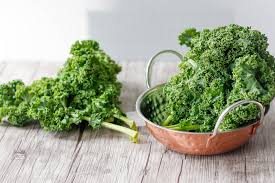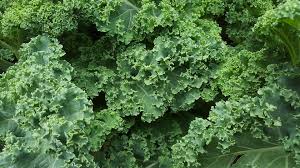Of all the super healthy greens, kale is the king. It is definitely one of the healthiest and most nutritious plant foods in existence. Kale is loaded with all sorts of beneficial compounds, some of which have powerful medicinal properties. Here are 7 health benefits of kale that are supported by science.
1. Kale Is Among The Most Nutrient-Dense Foods on The Planet
Kale is a popular vegetable and a member of the cabbage family. It is a cruciferous vegetable like cabbage, broccoli, cauliflower, collard greens and Brussels sprouts. There are many different types of kale. The leaves can be green or purple, and have either a smooth or curly shape. The most common type of kale is called curly kale or Scots kale, which has green and curly leaves and a hard, fibrous stem.
A single cup of raw kale (about 67 grams or 2.4 ounces) contains:
- Vitamin A: 206% of the DV (from beta-carotene)
- Vitamin K: 684% of the DV
- Vitamin C: 134% of the DV
- Vitamin B6: 9% of the DV
- Manganese: 26% of the DV
- Calcium: 9% of the DV
- Copper: 10% of the DV
- Potassium: 9% of the DV
- Magnesium: 6% of the DV
- It also contains 3% or more of the DV for vitamin B1 (thiamin), vitamin B2 (riboflavin), vitamin B3 (niacin), iron and phosphorus.

Kale, like other leafy greens, is very high in antioxidants. These include beta-carotene and vitamin C, as well as various flavonoids and polyphenols. Antioxidants are substances that help counteract oxidative damage by free radicals in the body. Oxidative damage is believed to be among the leading drivers of aging and many diseases, including cancer. But many substances that happen to be antioxidants also have other important functions. This includes the flavonoids quercetin and kaempferol, which are found in relatively large amounts in kale. These substances have been studied thoroughly in test tubes and animals. They have powerful heart-protective, blood pressure-lowering, anti-inflammatory, anti-viral, anti-depressant and anti-cancer effects, to name a few.
Vitamin C is an important water-soluble antioxidant that serves many vital functions in the body’s cells. For example, it is necessary for the synthesis of collagen, the most abundant structural protein in the body. Kale is much higher in vitamin C than most other vegetables, containing about 4.5 times much as spinach. The truth is, kale is actually one of the world’s best sources of vitamin C. A cup of raw kale contains even more vitamin C than a whole orange.
Substances called bile acid sequestrants can bind bile acids in the digestive system and prevent them from being reabsorbed. This reduces the total amount of cholesterol in the body.
Kale actually contains bile acid sequestrants, which can lower cholesterol levels. This might lead to a reduced risk of heart disease over time.

Vitamin K is an important nutrient. It is absolutely critical for blood clotting, and does this by “activating” certain proteins and giving them the ability to bind calcium. The well-known anticoagulant drug Warfarin actually works by blocking the function of this vitamin. Kale is one of the world’s best sources of vitamin K, with a single raw cup containing almost 7 times the recommended daily amount. The form of vitamin K in kale is K1, which is different than vitamin K2. K2 is found in fermented soy foods and certain animal products. It helps prevent heart disease and osteoporosis .
Kale has several properties that make it a weight loss friendly food. It is very low in calories but still provides significant bulk that should help you feel full. Because of the low calorie and high water content, kale has a low energy density. Eating plenty of foods with a low energy density has been shown to aid weight loss in numerous studies. Kale also contains small amounts of protein and fiber. These are two of the most important nutrients when it comes to losing weight.
One of the most common consequences of aging is that eyesight gets worse. Fortunately, there are several nutrients in the diet that can help prevent this from happening. Two of the main ones are lutein and zeaxanthin, carotenoid antioxidants that are found in large amounts in kale and some other foods. Many studies have shown that people who eat enough lutein and zeaxanthin have a much lower risk of macular degeneration and cataracts, two very common eye disorders.
Source:
www.healthline.com

i’m reading it right now! Love your blogs keep up the good work
I love your blog.. very nice colors & theme. Did you create this
website yourself or did you hire someone to do it for you?
Plz reply as I’m looking to create my own blog and would like to find out
where u got this from. thanks a lot http://shahyan.com/wiki/index.php/Which_Is_A_Better_Male_Enhancement_Cream
hi, how r u? I didn’t create this website, i works as a freelancer
hi. how r u? I haven’t created this website